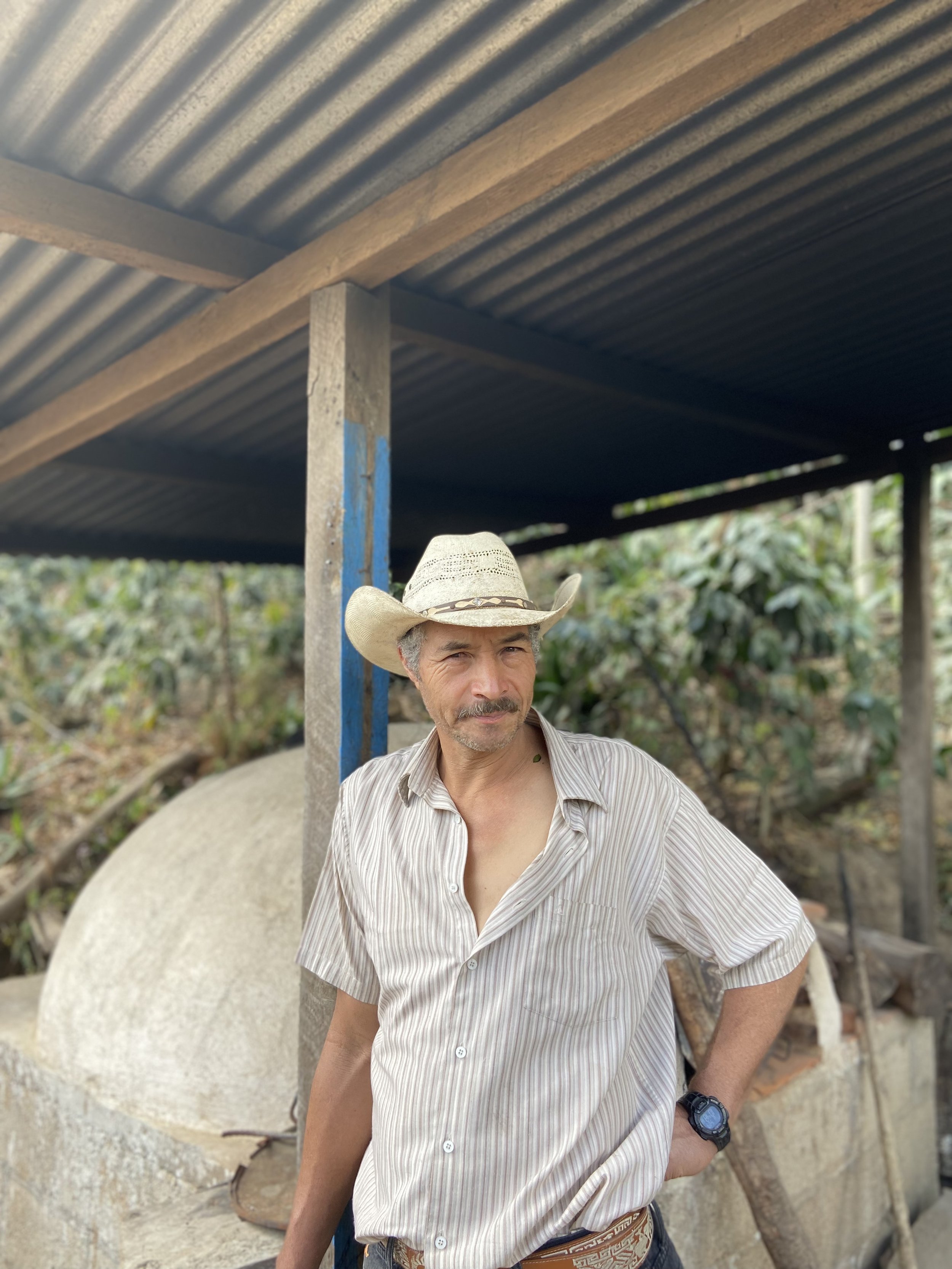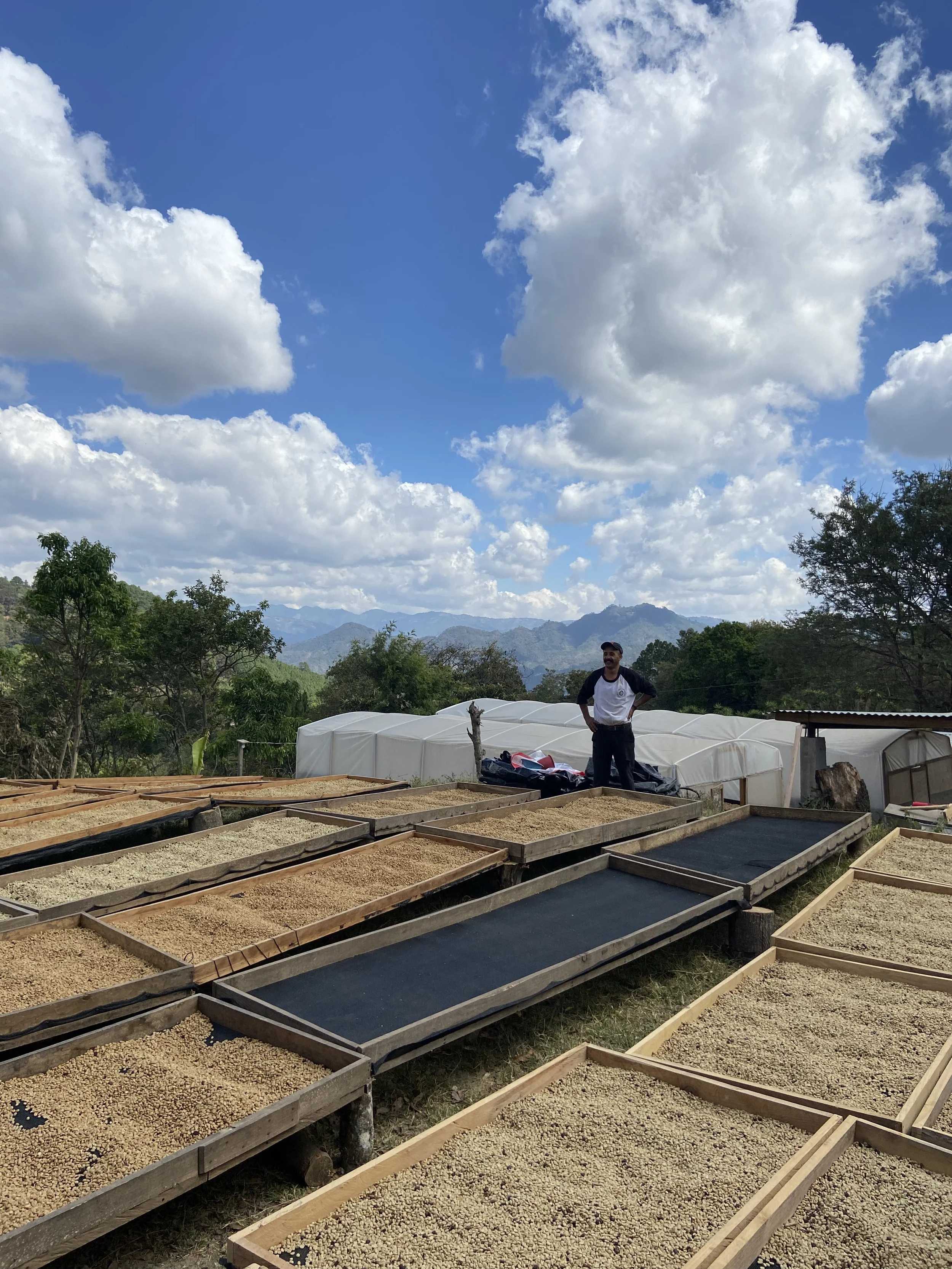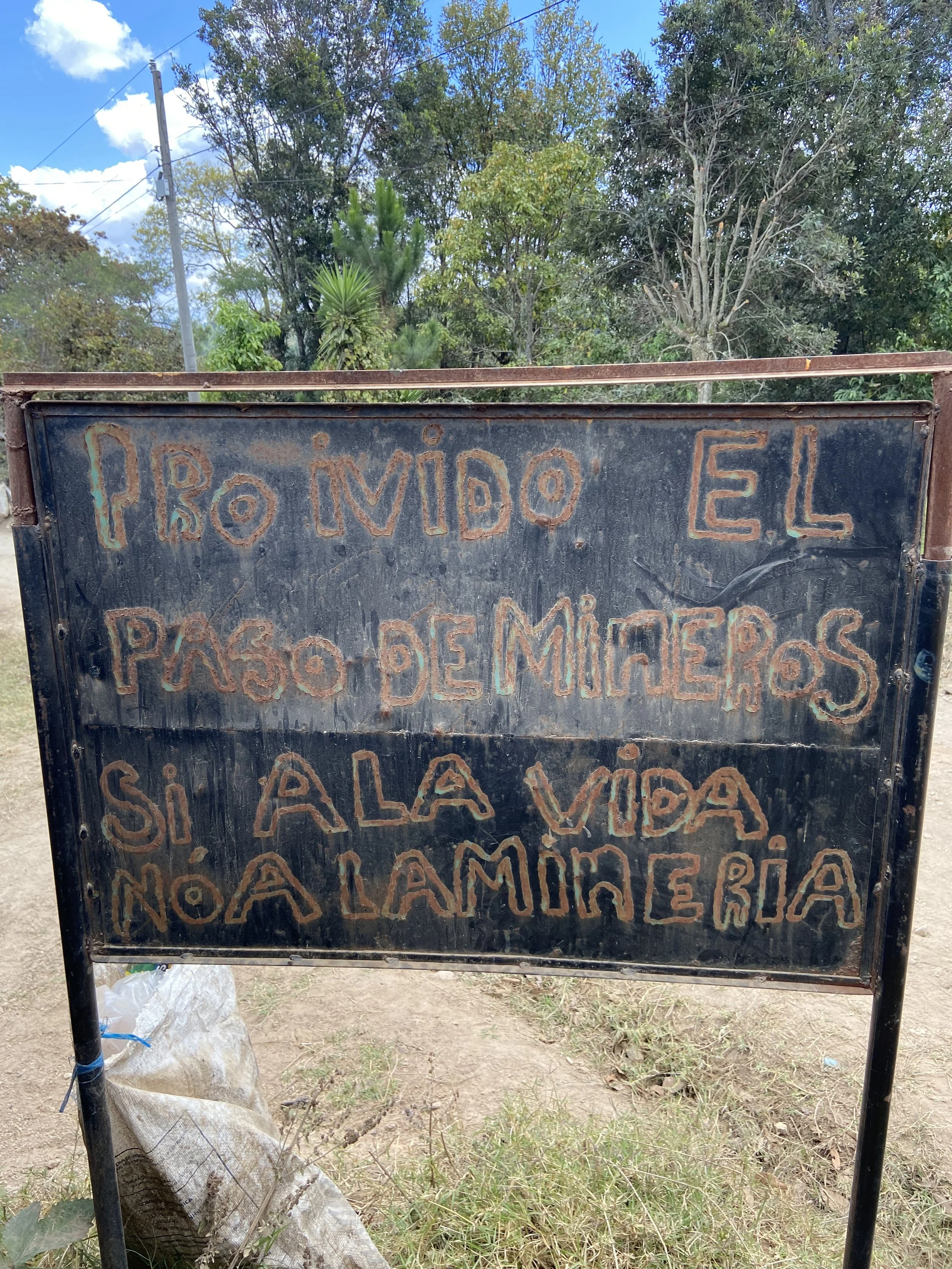Armando Quinteros - Guatemala, El Volcancito
We are extremely proud to begin partnering with the indigenous Xinca community in the El Volcancito area known as Cafe Colis Restistencia. We invite you to read at length Semilla’s account of their history, their community, and their victories in resisting settler colonialism. The more we have learned, the more inspired and grateful we are to work with these amazing coffees. This first lot comes from producer Armando Quinteros and exhibits an overwhelmingly drinkable cup that reminds us of milk chocolate, creamy nougat, and amaretto liqueur.
We Taste: Milk Chocolate, Amaretto, Nougat, Creamy
Country: Guatemala
Region: El Volcancito Casillas
Process: Washed
Lot name: El Matazano
Producer: Armando Quinteros
Varietal: Pache San Ramon and Catuai
Elevation: 1750
Harvest Date: April 2024
Farmgate price: 1850 Quetzal / quintal parchment coffee.
Regional farmgate price (2024): 1200 Quetzal / quintal parchment coffee.
FOB Price: $3.76USD/lb
Our Price: $4.95 USD/lb
Quantity Purchased: 4 × 70kgs
About this coffee:
Armando manages a 1.4 hectare farm of about 6,000 coffee plants called El Matazano. Cherries are picked at peak ripeness and then moved to the communal beneficio in El Volcancito. Here, they are floated and the remaining cherries are stored in sealed plastic bags in shade for 48 hours. The cherries are then depulped and left to dry ferment, again in sealed plastic bags, for another 40 hours. Once rinsed, the coffee is dried on raised beds for 15-17 days. Parchment is stored in a dry warehouse, sealed in plastic bags until milling.
Armando Quinteros:
A lifelong coffee grower with a lineage stretching back generations, Armando is yet another example of the experienced smallholders in this part of Guatemala who grow excellent coffee but aren’t given the chance to connect with a solid buyer who collaborates not only on pricing but also shares knowledge around best practices in coffee processing and offers traceability to the grower about their own supply chain.
Armando joined the Xinka Resistance in recent years and engaged in processing his coffees to parchment and preparing them for export and sale on the international market in 2022. This type of transition is a core driver behind Semilla’s work and it’s been incredible to see this small group of growers in the hamlet of El Volcancito step up as the first and only producers to process their coffee to parchment for international export in place of to selling in cherry to large local buyers who then process it for sale themselves.
Cafe Colis Resistencia:
Cafe Colis Resistencia is the name created by Alex Reynoso to identify coffee producing members of the Indigenous Xinka community around Mataquescuintla who are interested in developing an international market for their coffee, and therefore finally receiving fair prices for their work. The name Colis is a nickname for Mataquescuintla due to its fame form producing cauliflower (coliflor or Colis).
Guatemala’s history of coffee production has always erred to the support of major landowners of European or Mestizo descent, and relied upon the forced labor of Indigenous people to claim its place as one of Central America’s largest coffee producers. This violent and painful system leaves its vestigial remains in the monopolio that exists today — in short, a system of production and export in which the government supports major landholders while holding back resources and access to small producers such as those in Mataquescuintla. This monopoly not only keeps producers away from the market access they need for truly sustainable prices, but it also keeps them away from technical assistance and education that could propel them forward.
In essence, then, Cafe Colis Resistencia has little but themselves to rely upon. Semilla’s work with them has always been to primarily assist them in the development of an international market in Canada and the United States, providing the necessary access to technology and education that leads to more autonomous and sustainable coffee production.
The name Cafe Colis Resistencia builds off the storied history of resistance amongst the Xinka peoples, which traces its lineage back to the era of contact by Spanish conquistadors. The reformulations of settler colonialism manifest themselves today in the Escobal land concession leading to the purchase of a silver mine by Vancouver-based Tahoe Resources in 2010 which threatens the land, water, and air upon which the Xinka depend for survival.
Over years of protests, legal advocacy, and community organizing, the Xinka communities continued their resistance, culminating in a full blockade of the mine’s entrance in 2017. In July of the same year, this effort finally prompted the Constitutional Court to rule against Tahoe Resources and suspended their license pending a proper consultation process. This was a huge victory as not only were Indigenous rights recognized as necessary in the consultation process of mining projects, but specifically that the Xinka’s rights were recognized. This is considered hugely important by the Xinka as previously their existence had been denied. Since this time, Xinka populations have come to more accurately be represented in census data, counting 268,223 in the 2017 census, up from 16,214 in 2002.
- Semilla, 2024
We recognize that by investing in autonomy and independence over production, by ongoing community resistance to occupation, and by challenging the monopolized coffee sector in Guatemala, the producers of Cafe Colis Resistencia have taken enormous risks to lift up their community. We also recognize the need for coffee roasters like us to share in that risk - and stick to that risk - through ongoing commitments to buying equal or increasing quantities of coffee from this community every year, regardless of variables like cup quality. Our industry needs more equal distributions of risk on the basis of solidarity, and that begins with commitments to people, movements, and values over anything else.
We are extremely proud to begin partnering with the indigenous Xinca community in the El Volcancito area known as Cafe Colis Restistencia. We invite you to read at length Semilla’s account of their history, their community, and their victories in resisting settler colonialism. The more we have learned, the more inspired and grateful we are to work with these amazing coffees. This first lot comes from producer Armando Quinteros and exhibits an overwhelmingly drinkable cup that reminds us of milk chocolate, creamy nougat, and amaretto liqueur.
We Taste: Milk Chocolate, Amaretto, Nougat, Creamy
Country: Guatemala
Region: El Volcancito Casillas
Process: Washed
Lot name: El Matazano
Producer: Armando Quinteros
Varietal: Pache San Ramon and Catuai
Elevation: 1750
Harvest Date: April 2024
Farmgate price: 1850 Quetzal / quintal parchment coffee.
Regional farmgate price (2024): 1200 Quetzal / quintal parchment coffee.
FOB Price: $3.76USD/lb
Our Price: $4.95 USD/lb
Quantity Purchased: 4 × 70kgs
About this coffee:
Armando manages a 1.4 hectare farm of about 6,000 coffee plants called El Matazano. Cherries are picked at peak ripeness and then moved to the communal beneficio in El Volcancito. Here, they are floated and the remaining cherries are stored in sealed plastic bags in shade for 48 hours. The cherries are then depulped and left to dry ferment, again in sealed plastic bags, for another 40 hours. Once rinsed, the coffee is dried on raised beds for 15-17 days. Parchment is stored in a dry warehouse, sealed in plastic bags until milling.
Armando Quinteros:
A lifelong coffee grower with a lineage stretching back generations, Armando is yet another example of the experienced smallholders in this part of Guatemala who grow excellent coffee but aren’t given the chance to connect with a solid buyer who collaborates not only on pricing but also shares knowledge around best practices in coffee processing and offers traceability to the grower about their own supply chain.
Armando joined the Xinka Resistance in recent years and engaged in processing his coffees to parchment and preparing them for export and sale on the international market in 2022. This type of transition is a core driver behind Semilla’s work and it’s been incredible to see this small group of growers in the hamlet of El Volcancito step up as the first and only producers to process their coffee to parchment for international export in place of to selling in cherry to large local buyers who then process it for sale themselves.
Cafe Colis Resistencia:
Cafe Colis Resistencia is the name created by Alex Reynoso to identify coffee producing members of the Indigenous Xinka community around Mataquescuintla who are interested in developing an international market for their coffee, and therefore finally receiving fair prices for their work. The name Colis is a nickname for Mataquescuintla due to its fame form producing cauliflower (coliflor or Colis).
Guatemala’s history of coffee production has always erred to the support of major landowners of European or Mestizo descent, and relied upon the forced labor of Indigenous people to claim its place as one of Central America’s largest coffee producers. This violent and painful system leaves its vestigial remains in the monopolio that exists today — in short, a system of production and export in which the government supports major landholders while holding back resources and access to small producers such as those in Mataquescuintla. This monopoly not only keeps producers away from the market access they need for truly sustainable prices, but it also keeps them away from technical assistance and education that could propel them forward.
In essence, then, Cafe Colis Resistencia has little but themselves to rely upon. Semilla’s work with them has always been to primarily assist them in the development of an international market in Canada and the United States, providing the necessary access to technology and education that leads to more autonomous and sustainable coffee production.
The name Cafe Colis Resistencia builds off the storied history of resistance amongst the Xinka peoples, which traces its lineage back to the era of contact by Spanish conquistadors. The reformulations of settler colonialism manifest themselves today in the Escobal land concession leading to the purchase of a silver mine by Vancouver-based Tahoe Resources in 2010 which threatens the land, water, and air upon which the Xinka depend for survival.
Over years of protests, legal advocacy, and community organizing, the Xinka communities continued their resistance, culminating in a full blockade of the mine’s entrance in 2017. In July of the same year, this effort finally prompted the Constitutional Court to rule against Tahoe Resources and suspended their license pending a proper consultation process. This was a huge victory as not only were Indigenous rights recognized as necessary in the consultation process of mining projects, but specifically that the Xinka’s rights were recognized. This is considered hugely important by the Xinka as previously their existence had been denied. Since this time, Xinka populations have come to more accurately be represented in census data, counting 268,223 in the 2017 census, up from 16,214 in 2002.
- Semilla, 2024
We recognize that by investing in autonomy and independence over production, by ongoing community resistance to occupation, and by challenging the monopolized coffee sector in Guatemala, the producers of Cafe Colis Resistencia have taken enormous risks to lift up their community. We also recognize the need for coffee roasters like us to share in that risk - and stick to that risk - through ongoing commitments to buying equal or increasing quantities of coffee from this community every year, regardless of variables like cup quality. Our industry needs more equal distributions of risk on the basis of solidarity, and that begins with commitments to people, movements, and values over anything else.
We are extremely proud to begin partnering with the indigenous Xinca community in the El Volcancito area known as Cafe Colis Restistencia. We invite you to read at length Semilla’s account of their history, their community, and their victories in resisting settler colonialism. The more we have learned, the more inspired and grateful we are to work with these amazing coffees. This first lot comes from producer Armando Quinteros and exhibits an overwhelmingly drinkable cup that reminds us of milk chocolate, creamy nougat, and amaretto liqueur.
We Taste: Milk Chocolate, Amaretto, Nougat, Creamy
Country: Guatemala
Region: El Volcancito Casillas
Process: Washed
Lot name: El Matazano
Producer: Armando Quinteros
Varietal: Pache San Ramon and Catuai
Elevation: 1750
Harvest Date: April 2024
Farmgate price: 1850 Quetzal / quintal parchment coffee.
Regional farmgate price (2024): 1200 Quetzal / quintal parchment coffee.
FOB Price: $3.76USD/lb
Our Price: $4.95 USD/lb
Quantity Purchased: 4 × 70kgs
About this coffee:
Armando manages a 1.4 hectare farm of about 6,000 coffee plants called El Matazano. Cherries are picked at peak ripeness and then moved to the communal beneficio in El Volcancito. Here, they are floated and the remaining cherries are stored in sealed plastic bags in shade for 48 hours. The cherries are then depulped and left to dry ferment, again in sealed plastic bags, for another 40 hours. Once rinsed, the coffee is dried on raised beds for 15-17 days. Parchment is stored in a dry warehouse, sealed in plastic bags until milling.
Armando Quinteros:
A lifelong coffee grower with a lineage stretching back generations, Armando is yet another example of the experienced smallholders in this part of Guatemala who grow excellent coffee but aren’t given the chance to connect with a solid buyer who collaborates not only on pricing but also shares knowledge around best practices in coffee processing and offers traceability to the grower about their own supply chain.
Armando joined the Xinka Resistance in recent years and engaged in processing his coffees to parchment and preparing them for export and sale on the international market in 2022. This type of transition is a core driver behind Semilla’s work and it’s been incredible to see this small group of growers in the hamlet of El Volcancito step up as the first and only producers to process their coffee to parchment for international export in place of to selling in cherry to large local buyers who then process it for sale themselves.
Cafe Colis Resistencia:
Cafe Colis Resistencia is the name created by Alex Reynoso to identify coffee producing members of the Indigenous Xinka community around Mataquescuintla who are interested in developing an international market for their coffee, and therefore finally receiving fair prices for their work. The name Colis is a nickname for Mataquescuintla due to its fame form producing cauliflower (coliflor or Colis).
Guatemala’s history of coffee production has always erred to the support of major landowners of European or Mestizo descent, and relied upon the forced labor of Indigenous people to claim its place as one of Central America’s largest coffee producers. This violent and painful system leaves its vestigial remains in the monopolio that exists today — in short, a system of production and export in which the government supports major landholders while holding back resources and access to small producers such as those in Mataquescuintla. This monopoly not only keeps producers away from the market access they need for truly sustainable prices, but it also keeps them away from technical assistance and education that could propel them forward.
In essence, then, Cafe Colis Resistencia has little but themselves to rely upon. Semilla’s work with them has always been to primarily assist them in the development of an international market in Canada and the United States, providing the necessary access to technology and education that leads to more autonomous and sustainable coffee production.
The name Cafe Colis Resistencia builds off the storied history of resistance amongst the Xinka peoples, which traces its lineage back to the era of contact by Spanish conquistadors. The reformulations of settler colonialism manifest themselves today in the Escobal land concession leading to the purchase of a silver mine by Vancouver-based Tahoe Resources in 2010 which threatens the land, water, and air upon which the Xinka depend for survival.
Over years of protests, legal advocacy, and community organizing, the Xinka communities continued their resistance, culminating in a full blockade of the mine’s entrance in 2017. In July of the same year, this effort finally prompted the Constitutional Court to rule against Tahoe Resources and suspended their license pending a proper consultation process. This was a huge victory as not only were Indigenous rights recognized as necessary in the consultation process of mining projects, but specifically that the Xinka’s rights were recognized. This is considered hugely important by the Xinka as previously their existence had been denied. Since this time, Xinka populations have come to more accurately be represented in census data, counting 268,223 in the 2017 census, up from 16,214 in 2002.
- Semilla, 2024
We recognize that by investing in autonomy and independence over production, by ongoing community resistance to occupation, and by challenging the monopolized coffee sector in Guatemala, the producers of Cafe Colis Resistencia have taken enormous risks to lift up their community. We also recognize the need for coffee roasters like us to share in that risk - and stick to that risk - through ongoing commitments to buying equal or increasing quantities of coffee from this community every year, regardless of variables like cup quality. Our industry needs more equal distributions of risk on the basis of solidarity, and that begins with commitments to people, movements, and values over anything else.




